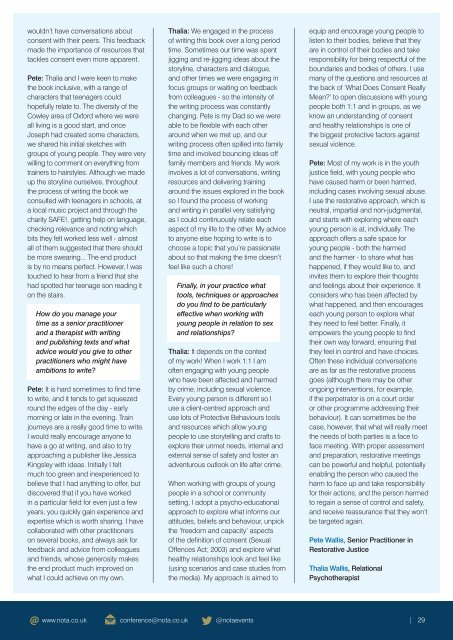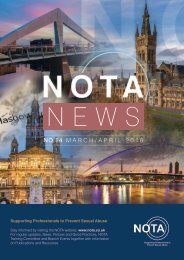NOTA News Newsletter July 2018 1
Create successful ePaper yourself
Turn your PDF publications into a flip-book with our unique Google optimized e-Paper software.
wouldn’t have conversations about<br />
consent with their peers. This feedback<br />
made the importance of resources that<br />
tackles consent even more apparent.<br />
Pete: Thalia and I were keen to make<br />
the book inclusive, with a range of<br />
characters that teenagers could<br />
hopefully relate to. The diversity of the<br />
Cowley area of Oxford where we were<br />
all living is a good start, and once<br />
Joseph had created some characters,<br />
we shared his initial sketches with<br />
groups of young people. They were very<br />
willing to comment on everything from<br />
trainers to hairstyles. Although we made<br />
up the storyline ourselves, throughout<br />
the process of writing the book we<br />
consulted with teenagers in schools, at<br />
a local music project and through the<br />
charity SAFE!, getting help on language,<br />
checking relevance and noting which<br />
bits they felt worked less well - almost<br />
all of them suggested that there should<br />
be more swearing... The end product<br />
is by no means perfect. However, I was<br />
touched to hear from a friend that she<br />
had spotted her teenage son reading it<br />
on the stairs.<br />
How do you manage your<br />
time as a senior practitioner<br />
and a therapist with writing<br />
and publishing texts and what<br />
advice would you give to other<br />
practitioners who might have<br />
ambitions to write?<br />
Pete: It is hard sometimes to find time<br />
to write, and it tends to get squeezed<br />
round the edges of the day - early<br />
morning or late in the evening. Train<br />
journeys are a really good time to write.<br />
I would really encourage anyone to<br />
have a go at writing, and also to try<br />
approaching a publisher like Jessica<br />
Kingsley with ideas. Initially I felt<br />
much too green and inexperienced to<br />
believe that I had anything to offer, but<br />
discovered that if you have worked<br />
in a particular field for even just a few<br />
years, you quickly gain experience and<br />
expertise which is worth sharing. I have<br />
collaborated with other practitioners<br />
on several books, and always ask for<br />
feedback and advice from colleagues<br />
and friends, whose generosity makes<br />
the end product much improved on<br />
what I could achieve on my own.<br />
Thalia: We engaged in the process<br />
of writing this book over a long period<br />
time. Sometimes our time was spent<br />
jigging and re-jigging ideas about the<br />
storyline, characters and dialogue,<br />
and other times we were engaging in<br />
focus groups or waiting on feedback<br />
from colleagues - so the intensity of<br />
the writing process was constantly<br />
changing. Pete is my Dad so we were<br />
able to be flexible with each other<br />
around when we met up, and our<br />
writing process often spilled into family<br />
time and involved bouncing ideas off<br />
family members and friends. My work<br />
involves a lot of conversations, writing<br />
resources and delivering training<br />
around the issues explored in the book<br />
so I found the process of working<br />
and writing in parallel very satisfying<br />
as I could continuously relate each<br />
aspect of my life to the other. My advice<br />
to anyone else hoping to write is to<br />
choose a topic that you’re passionate<br />
about so that making the time doesn’t<br />
feel like such a chore!<br />
Finally, in your practice what<br />
tools, techniques or approaches<br />
do you find to be particularly<br />
effective when working with<br />
young people in relation to sex<br />
and relationships?<br />
Thalia: It depends on the context<br />
of my work! When I work 1:1 I am<br />
often engaging with young people<br />
who have been affected and harmed<br />
by crime, including sexual violence.<br />
Every young person is different so I<br />
use a client-centred approach and<br />
use lots of Protective Behaviours tools<br />
and resources which allow young<br />
people to use storytelling and crafts to<br />
explore their unmet needs, internal and<br />
external sense of safety and foster an<br />
adventurous outlook on life after crime.<br />
When working with groups of young<br />
people in a school or community<br />
setting, I adopt a psycho-educational<br />
approach to explore what informs our<br />
attitudes, beliefs and behaviour, unpick<br />
the ‘freedom and capacity’ aspects<br />
of the definition of consent (Sexual<br />
Offences Act; 2003) and explore what<br />
healthy relationships look and feel like<br />
(using scenarios and case studies from<br />
the media). My approach is aimed to<br />
equip and encourage young people to<br />
listen to their bodies, believe that they<br />
are in control of their bodies and take<br />
responsibility for being respectful of the<br />
boundaries and bodies of others. I use<br />
many of the questions and resources at<br />
the back of ‘What Does Consent Really<br />
Mean?’ to open discussions with young<br />
people both 1:1 and in groups, as we<br />
know an understanding of consent<br />
and healthy relationships is one of<br />
the biggest protective factors against<br />
sexual violence.<br />
Pete: Most of my work is in the youth<br />
justice field, with young people who<br />
have caused harm or been harmed,<br />
including cases involving sexual abuse.<br />
I use the restorative approach, which is<br />
neutral, impartial and non-judgmental,<br />
and starts with exploring where each<br />
young person is at, individually. The<br />
approach offers a safe space for<br />
young people - both the harmed<br />
and the harmer - to share what has<br />
happened, if they would like to, and<br />
invites them to explore their thoughts<br />
and feelings about their experience. It<br />
considers who has been affected by<br />
what happened, and then encourages<br />
each young person to explore what<br />
they need to feel better. Finally, it<br />
empowers the young people to find<br />
their own way forward, ensuring that<br />
they feel in control and have choices.<br />
Often these individual conversations<br />
are as far as the restorative process<br />
goes (although there may be other<br />
ongoing interventions, for example,<br />
if the perpetrator is on a court order<br />
or other programme addressing their<br />
behaviour). It can sometimes be the<br />
case, however, that what will really meet<br />
the needs of both parties is a face to<br />
face meeting. With proper assessment<br />
and preparation, restorative meetings<br />
can be powerful and helpful, potentially<br />
enabling the person who caused the<br />
harm to face up and take responsibility<br />
for their actions, and the person harmed<br />
to regain a sense of control and safety,<br />
and receive reassurance that they won’t<br />
be targeted again.<br />
Pete Wallis, Senior Practitioner in<br />
Restorative Justice<br />
Thalia Wallis, Relational<br />
Psychotherapist<br />
www.nota.co.uk conference@nota.co.uk @notaevents<br />
| 29





